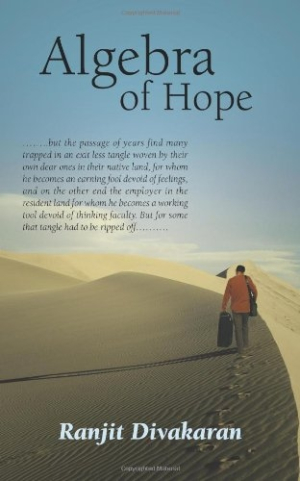Algebra of Hope
The exploitation of Indian and other foreign workers in the Arab states of the Persian Gulf is usually thought to apply to those doing the physical labor that the oil-rich locals feel is beneath them. In his novel, Algebra of Hope, Ranjit Divakaran shows a foreign doctor treated just as badly. Despite the education and talent of the main character, Rakesh, the young doctor is classified as an “income-generating slave” from whom masters will “squeeze every bit of his sweat.”
Divakaran is a doctor, and while his book is a work of fiction, it is based on his own experiences during twelve years in the Middle East. He tells the story through Rakesh, who leaves his wife and infant daughter in India to take a job at a hospital in Saudi Arabia. From the day of his arrival, Rakesh realizes that the managers, who are also Indians, are corrupt and out to cheat both their employers and the employees they oversee. The novel is an indictment not only of the greed and corruption within the foreign-worker system in Saudi Arabia but also of a medical system that puts profit above patients.
The struggle of Rakesh and a plucky young nurse named Neerja to reform that system will resonate with any who have come up against a crooked boss or have been frustrated by a bureaucracy with a warped mission. Divakaran adds a layer of despair felt by foreign workers in the Arab world, people for whom “happiness was a guest which visited them once a month and stayed only as long as the queue in the money-exchange centre.”
Divakaran emotionally and colorfully explains the pressure felt by these workers—from taxi drivers to surgeons—to work hard not just for their own benefit but also for their families back home, either to enable them to survive or to get them out of debt. Many of these workers, however, are also “burdened with unrealistic expectations” of their families, some to the degree that they felt they were “important only as long as [they] sent money home.”
Having walked in their shoes, Divakaran has a flair for describing the emotions and frustrations of his characters and the environment in which they live and work. He observes that walking around outside the air-conditioned buildings in Saudi Arabia at midday “would be like getting barbecued” and that many of the women he worked with put on their “rouge, mascara, and lipstick in the right places but in the wrong quantities, as if the expiry dates were soon approaching.”
Algebra of Hope is a revealing, emotional, and heartfelt saga of the grim lives of foreign workers in the Arab world, and it makes for a memorable and eye-opening read.
Reviewed by
Mark McLaughlin
Disclosure: This article is not an endorsement, but a review. The publisher of this book provided free copies of the book and paid a small fee to have their book reviewed by a professional reviewer. Foreword Reviews and Clarion Reviews make no guarantee that the publisher will receive a positive review. Foreword Magazine, Inc. is disclosing this in accordance with the Federal Trade Commission’s 16 CFR, Part 255.

